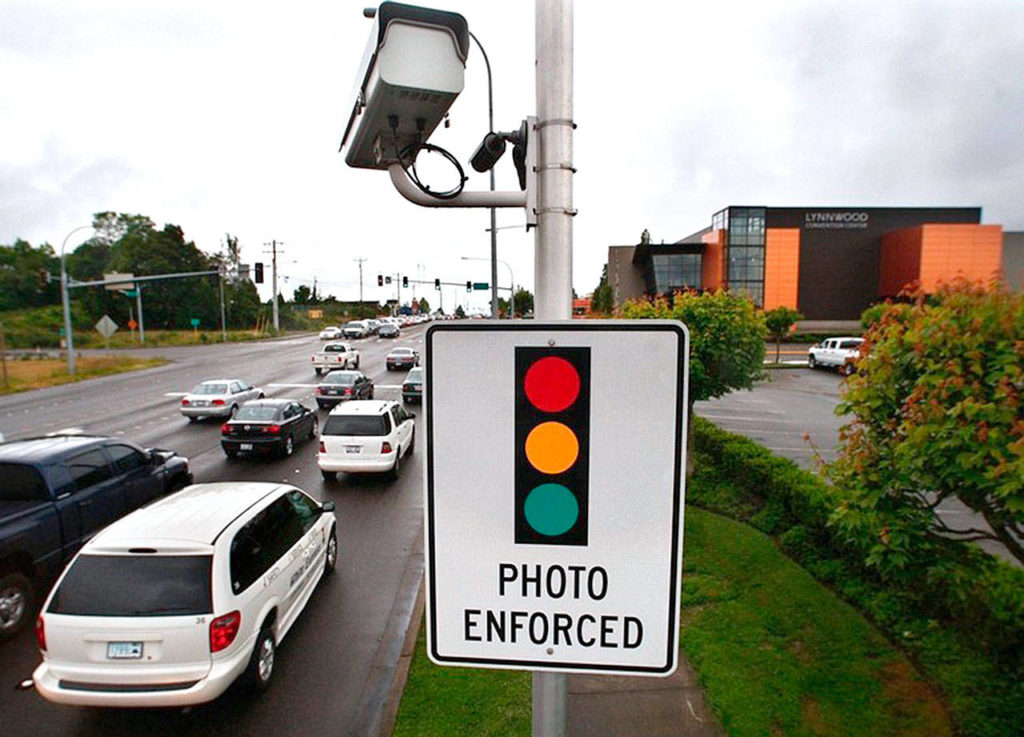EVERETT — Red-light runners’ and school-zone speeders’ days could be numbered at several locations across the city.
The Everett City Council is set to hear a presentation about possibly implementing red-light and school-zone cameras around the city. A vote is not expected, and the agenda item does not include a staff recommendation.
An ordinance approved in 2008 permits the devices, but city leaders never implemented them while waiting for early legal challenges to work through the courts. A federal judge in 2017 ruled that Lynnwood’s lucrative red-light cameras did not violate a man’s civil rights.
State law allows them at railroad crossings, in school zones and at intersections of two or more arterial roads that have traffic signals. Law also prohibits governments from reducing the yellow light’s time after the cameras are installed and requires signage notifying drivers of the devices.
The camera programs have yielded millions of dollars to governments using them, often through a lease with companies that install them. Everett wouldn’t pay any capital costs for the devices but would have ongoing staff expenses for police, court clerks and traffic department employees to manage and review the videos and process citations, which are treated like parking tickets and issued to the vehicle’s registered owner based on license plates rather than identifying the alleged drivers.
Starting in late 2019, Everett’s public works department led discussions about reconsidering the program with the council’s public safety subcommittee.
City staff declined to say until after the presentation to the council whether possible locations have changed in the past year. But staff and committee members discussed locations at six intersections and one school zone at the end of 2019 and again during the last recorded public safety meeting on Feb. 12, 2020.
Everett’s possible red-light camera locations were identified based on collision and infraction data, Public Works Director Ryan Sass said at the meeting. They include:
• Northbound Rucker Avenue at Pacific Avenue;
• Eastbound Pacific at Rucker;
• Southbound Evergreen Way at Madison Street;
• Northbound Evergreen at E. Casino Road;
• Eastbound Casino and Evergreen;
• Southwest-bound Evergreen at Fourth Avenue W.;
• Evergreen Way at the westbound Highway 526 off-ramp.
“Of the six locations, all of them are in the top 13 of crash frequency,” Sass said. “There is a strong correlation with where we have proposed red-light cameras to be implemented with crash data.”
But the top two locations for crash frequency were not on the list then, Councilmember Scott Murphy noted at the meeting. If the city council wanted to proceed with the devices, staff could revisit the locations and crash data, Sass said.
Four of the previously identified intersections averaged 54 crashes per year between 2012 and 2016, Sass said. At least 25% of those result in an injury.
“If we saw reductions of around 25%, that would be mean about 13 fewer crashes per intersection annually and probably about four fewer injury crashes per intersection annually,” he said.
Horizon Elementary School was considered first for a school zone speed enforcement camera on Casino Road because of the high speed there and the road’s status as an arterial. Others could follow at Emerson Elementary on southbound Seventh Avenue SE and Madison Elementary on eastbound Pecks Drive, but those locations would require data collection and evaluation, Sass said.
“We owe it to our children that are very vulnerable in those situations to try to help them out and protect them,” City Councilmember Judy Tuohy said.
The red-light camera photo enforcement lease could cost about $350,000 per year, with revenue estimates between $1.1 million to $1.2 million, Sass said. A school zone camera at one location costs about $100,000 per year, with revenue around $203,000. Staffing for the program could require full-time work by a police officer to review the videos and determine citations, a court clerk, traffic technicians and an engineer and cost $453,000, he said.
City staff estimated $472,000 in annual net revenue from the red-light cameras after the devices have been in place for two or three years and driver behavior changes, which is the overall goal, Sass said. The city’s ordinance requires revenue earned beyond the program’s costs be spent on traffic safety, such as school zone beacons, rectangular rapid flashing beacons and crosswalk improvements, radar speed devices and traffic emphasis enforcement by police.
But none of those would necessarily be dedicated to the areas of the cameras. Rather, the city could follow its already established method to prioritize traffic safety projects.
Ben Watanabe: bwatanabe@heraldnet.com; 425-339-3037; Twitter @benwatanabe.
Talk to us
> Give us your news tips.
> Send us a letter to the editor.
> More Herald contact information.


























